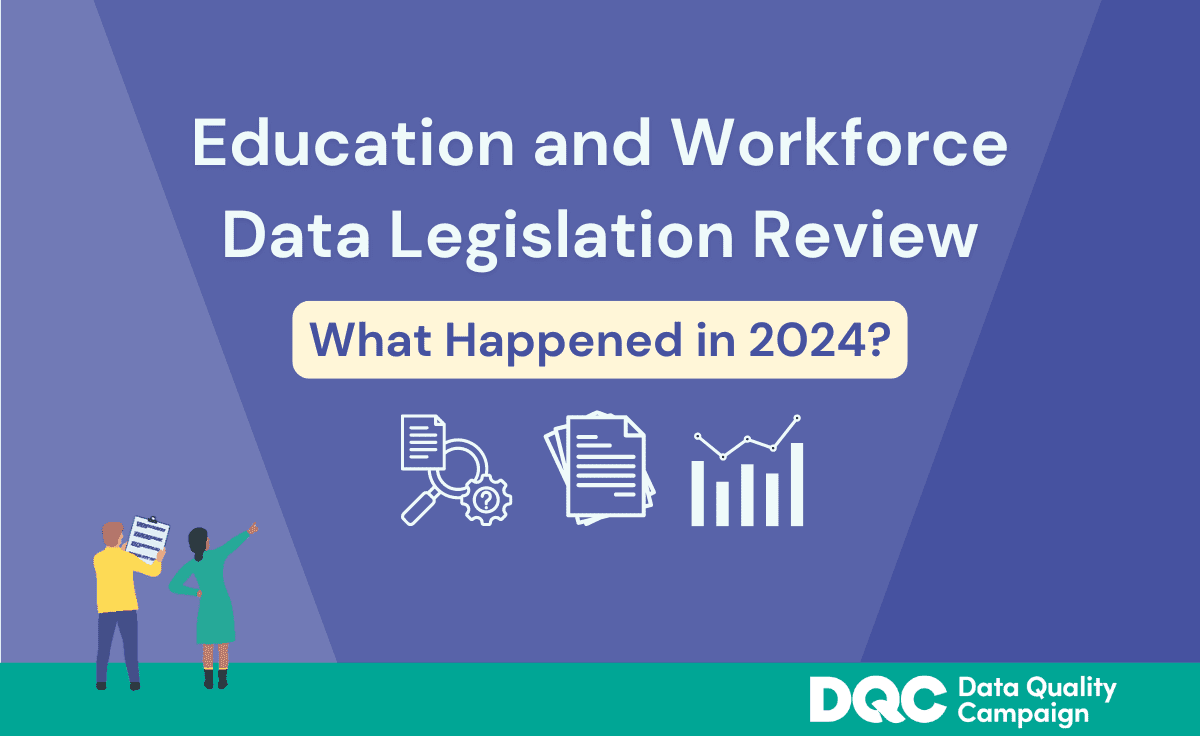Data Quality Campaign analysis shows continued state momentum for cross-agency data governance this year.
WASHINGTON (August 28, 2024) –In 2024, state legislators made significant strides toward enhancing access to data for decisionmaking. Across the country, legislators introduced hundreds of bills that would impact data collection, access, and use across early education, K–12, postsecondary, and the workforce. The Data Quality Campaign’s (DQC) latest report, Education and Workforce Data Legislation: What Happened in 2024?, details DQC’s analysis of state legislative trends and highlights state legislative efforts to advance state data systems through cross-agency data governance and facilitate transitions from high school to college and the workforce, leveraging linked data to make students’ journeys more seamless.
“States are continuing to demonstrate their commitment to providing individuals, the public, and policymakers with the information necessary to make decisions about transitions between education and workforce,” said DQC President and CEO Jennifer Bell-Ellwanger. “Data governance, access, and use is—and must remain—a priority for state legislatures as they build and maintain data systems that enable robust data access for people.”
This year, Colorado joined eight states that had previously codified cross-agency data governance by enacting a workforce development law that sets the stage for improved policy decisions and equitable access to data. Colorado’s law establishes the Colorado Statewide Longitudinal Data System within the Office of Informational Technology and mandates a leadership-level governing board to oversee the data system. The law also secures $5 million in state funding and requires annual reports on postsecondary and workforce outcomes, supporting education-to-career pathways and workforce readiness. This key legislation marks a significant step toward enhancing workforce readiness through improved data governance.
Other states took concrete steps to invest in enhancing their data systems, including:
- In Alabama, legislators reinforced their commitment to supporting the recently established statewide longitudinal data system (SLDS) by allocating in the annual budget $1 million and three full-time employees to the Office of Education and Workforce Statistics (the entity that houses Alabama’s SLDS).
- New York legislators appropriated $20.4 million in first-time funding in the annual budget to support the development and implementation of an SLDS. This funding is designated for enhancing data infrastructure, including the purchase of necessary technology and equipment.
- Virginia established a working group to recommend improvements to the Virginia Longitudinal Data System (VLDS) and the Workforce Data Trust. Led by the Virginia secretary of education, the group will aim to support evidence-based research and policymaking.
Legislators also enacted policies that use data to help smooth pathways from high school to whatever comes next—whether that is college or career.
- Colorado passed a new law that requires public higher education institutions to cover the remaining balance of the total cost of attendance for students who have experienced homelessness after any private, state, or federal financial assistance has been applied.
- Maryland policymakers reworked the process for how the Maryland Higher Education Commission approves postsecondary programs, requiring that programs meet statewide and regional workforce needs.
- In Vermont, legislators established a new Office of Workforce Expansion and Development that will equip policymakers with a more comprehensive understanding of Vermont’s current and future workforce needs.
- Washington policymakers passed legislation to automatically qualify 10th-, 11th-, and 12th-grade students who receive food benefits for the Washington College Grant, ensuring timely access to financial aid and support for these students and making postsecondary education attainable.
“Whether you are a policymaker that needs data to fund programs that help meet your state’s goals or a job seeker trying to ensure that you’re pursuing a worthwhile credential, access to data is the necessary common thread,” said Bell-Ellwanger. “Legislators must continue their efforts to build robust data systems that people can use to support pathways through education and career.”
Read the Data Quality Campaign’s full report here.
###
The Data Quality Campaign is a nonprofit policy and advocacy organization leading the effort to ensure that data works for everyone navigating their education and workforce journeys. For more information, go to dataqualitycampaign.org and follow us on LinkedIn and Twitter.


